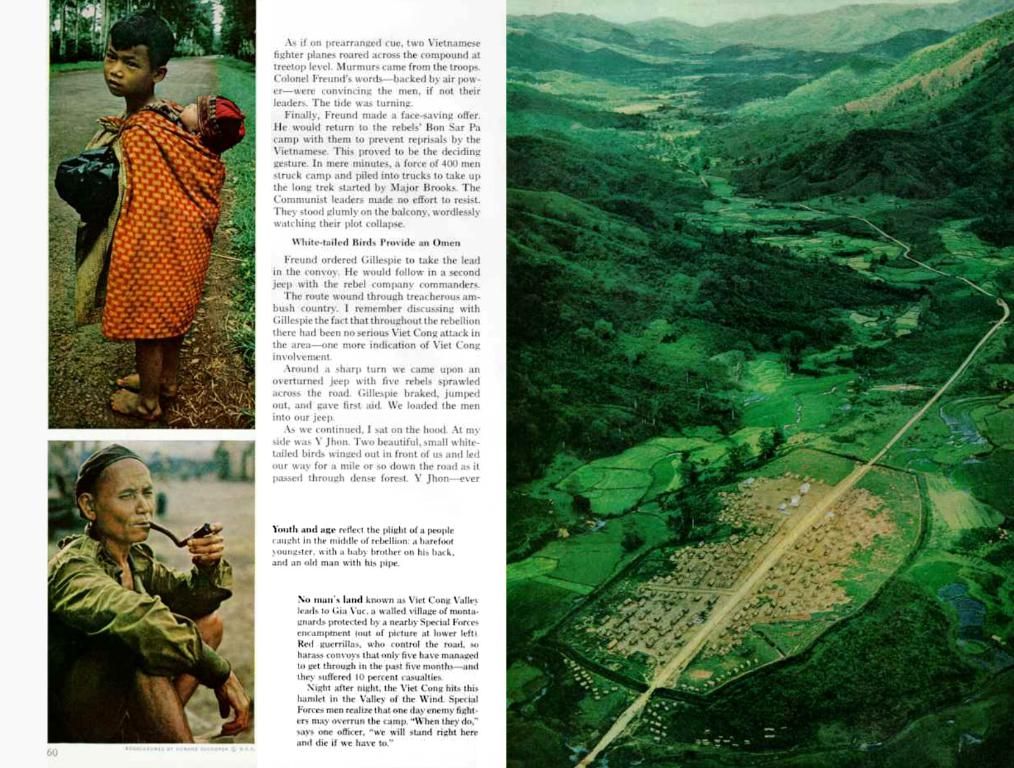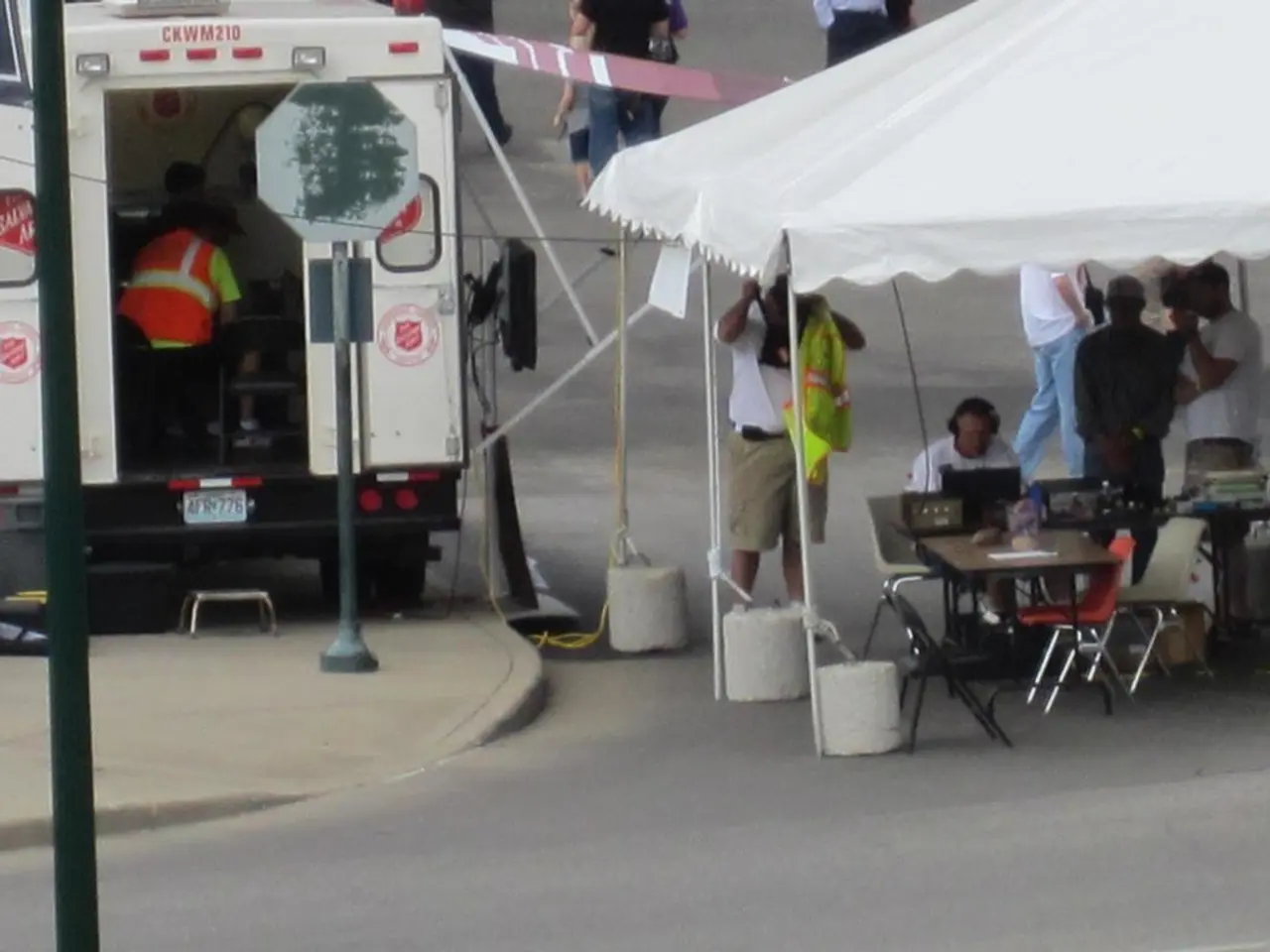Alien Encounters in Worlds Beyond: Exploring UFO Phenomena, Folklore, and Possible Parallel Realms
Buckle up for a wild ride: Exploring Earth's Odd Encounters - UFOs, Folklore, and Parallel Worlds
Gear up for a mind-bending journey through the unknown with "Passport to Magonia: On UFOs, Folklore, and Parallel Worlds," a groundbreaking book by the notorious Jacques Vallée. This renowned computer scientist, astronomer, and UFO researcher dropped a bomb in 1969, proposing that UFOs might not be extraterrestrial beings from far-off planets, but rather... well, let's just say it gets weird from here.
- It's Not What You Think: Vallée suggests that the UFO phenomenon is an ongoing, age-old thread running through our human history, and it's not exclusively a modern-day phenomenon. By comparing present-day UFO sightings with ancient MYTHS and LEGENDS from various CULTURES, Vallée posits that seemingly unrelated events may share a common underlying mystery.
- The Power of Perception: Vallée believes that our interpretation of UFO encounters is heavily swayed by our cultural background and religious BELIEFS. He offers numerous examples of how different cultures have interpreted the SAME phenomena in radically different ways, from supernatural entities in ancient mythology to advanced extraterrestrial visitors today.
- Beyond the Known Universe: One of the main claims in "Passport to Magonia" is the "Ultraterrestrial Hypothesis," suggesting that UFOs could stem from another dimension, sometimes referred to as "another realm" or "Otherworld." Vallée theorizes that these entities can manipulate our REALITY and PERCEPTION, leading to a plethora of seemingly unbelievable encounters.
- Behind the Mystery: Vallée introduces the concept of a "Control System" that allegedly manipulates human society through a series of seemingly unrelated paranormal events. This hidden control mechanism could be responsible for shaping our religious beliefs, mythology, and, of course, UFO phenomena.
- Pattern Recognition: Vallée pinpoints specific patterns and similarities in UFO sightings, such as recurring types of entities, specific symbols, and connections to bodies of water.
- Ancient Times and Modern Mythology: Vallée showcases examples of modern UFO encounters paralleling ancient MYTHS and LEGENDS, including fairies, elves, and other supernatural beings.
From faeries and elves to spiritual guides or divine manifestations, Vallée demonstrates that the interpretation of the unknown is not static but evolves over time, influenced by our cultural and historical context. Here are a few examples to explain:
- Fairies and Elves: In ancient folklore, particularly Celtic and Scandinavian traditions, stories of encounters with fairies, elves, and other supernatural beings were common. Vallée suggests that these narratives share striking similarities with modern UFO and alien encounters, implying they could possibly be expressions of the same underlying mystery, framed by the PREVALING CULTURAL BELIEFS.
- Native American Legends: Many indigenous cultures in North America have their own stories of supernatural beings or "star people" who visited or interacted with humans. Vallée posits that these legends could be tales of encounters with the same phenomenon responsible for modern UFO sightings - presented within the unique cultural and spiritual framework of Native American cultures.
- Religious Interpretations: Throughout history, people have often interpreted unidentified phenomena in RELIGIOUS terms, such as the "wheel within a wheel" vision in the Hebrew BIBLE and medieval European Christian art.
- Modern UFO Encounters: In the 20th and 21st centuries, as humanity developed a more sophisticated understanding of the universe and space travel, the interpretation of unidentified phenomena transformed towards a technological and extraterrestrial explanation. People started reporting encounters with advanced spacecraft and extraterrestrial beings, often referred to as "aliens" or "exotic visitors."
By providing these examples, Vallée shows that our understanding of the unknown is fluid, evolving over time, and profoundly impacted by our cultural and historical context.
Some noteworthy figures mentioned in the book include:
- Charles Fort: An American writer known for his research on anomalous phenomena, Fort's ideas about a hidden control system influenced Vallée's thoughts.
- Carl Gustav Jung: A Swiss psychiatrist, Jung's theories on the collective unconscious and archetypes played a role in Vallée's UFO theories.
Several other books have been written based on or inspired by Vallée's work, including:
- "Operation Trojan Horse" by John Keel: A book expanding on Vallée's ideas, examining the possible connections between UFOs, supernatural events, and other unexplained phenomena.
- "The Mothman Prophecies" by John Keel: An exploration of the mysterious Mothman sightings in West Virginia, connecting them to Vallée's control system theory.
- "Messengers of Deception: UFO Contacts and Cults" by Jacques Vallée: A follow-up to "Passport to Magonia," delving deeper into the manipulative aspects of UFO phenomenon and its influence on human belief systems.
- "Dimensions: A Casebook of Alien Contact" by Jacques Vallée: A book further developing Vallée's ideas, focusing on the multidimensional nature of the UFO phenomenon and its potential links to other paranormal events.
- "The Trickster and the Paranormal" by George P. Hansen: A book exploring the role of the trickster archetype in various paranormal phenomena, including UFOs, referencing Vallée's work in "Passport to Magonia."
"Passport to Magonia: On UFOs, Folklore, and Parallel Worlds" presents a unique perspective on UFOs, challenging traditional extraterrestrial explanations. Vallée offers compelling evidence to suggest that UFOs and their occupants may be part of a larger, multidimensional reality that has influenced human culture and beliefs for centuries. By drawing connections between modern UFO encounters and ancient mythology, Vallée posits that these seemingly disparate events may share a common underlying mystery.
Jacques Vallée
A French-American computer scientist, venture capitalist, and UFO researcher, Vallée was born on September 24, 1939, in Pontoise, France. Renowned for his substantial contributions to computer science and his meticulous study of unidentified flying objects (UFOs), Vallée is a trailblazer who challenges our understanding of the unknown.
Fastwalkers
Fastwalkers, a term popular in UFO circles, refers to objects moving at high speeds in the sky. Fastwalkers have been spotted by everyone from amateur sky watchers to military personnel and government agencies worldwide. The term "Fastwalker" was allegedly coined by the North American Aerospace Defense Command (NORAD).
Psychology and UFO
Exploring the psychological aspect of UFOs offers a powerful lens for analyzing the experiences of those reporting sightings and encounters. It delves into both the potential existence of UFOs and their subjective human interpretations,enshrouding the scientific, paranormal, and philosophical spheres in mystery and intrigue.
1.ucked into the deep-rooted suspicion that UFO sightings might be intertwined with the world of sports, Vallée presents accounts of sports-betting enthusiasts who allegedly witnessed strange, unexplained aerial phenomena during critical sporting events, believing these were signs of impending victories orchestrated by extraterrestrial forces.2. The book also sheds light on mysterious disappearances and alleged abductions, theory-laden incidents where individuals claim to have been taken by otherworldly beings, with accounts bridging the gap between the 1950s and modern-day narratives.3. In the twilight zone where paranormal activity and high-stakes gambling meet, shadowy figures manipulate the market's perception through the use of Fastwalkers, creating enough commotion to throw off competitors and secure significant winnings in their favor.4. Despite heavy criticism and accusations of delving into the realm of conspiracy theories, Vallée's work offers an intriguing lens through which to view the human experience and our ongoing efforts to comprehend the unexplained.5. As the realization of extraterrestrial life becomes increasingly apparent to the general public, psychologists and sociologists join the fray, seeking to understand why individuals experience UFO sightings in various cultural, religious, and historical contexts through competing explanations like collective hallucinations or mass hysteria.6. Amidst the chaos and controversy, Vallée continues to assert his Ultraterrestrial Hypothesis, remaining steadfast in his conviction that UFOs and their occupants embody the ultimate mystery, a multiple-dimensional enigma that transcends our earthly understanding.7. Regardless of the numerous theories surrounding the UFO phenomenon, one undeniable truth prevails: the human fascination with the unknown continues to fuel our collective imaginations, driving us to explore new frontiers with unbridled curiosity and a thirst for adventure.







